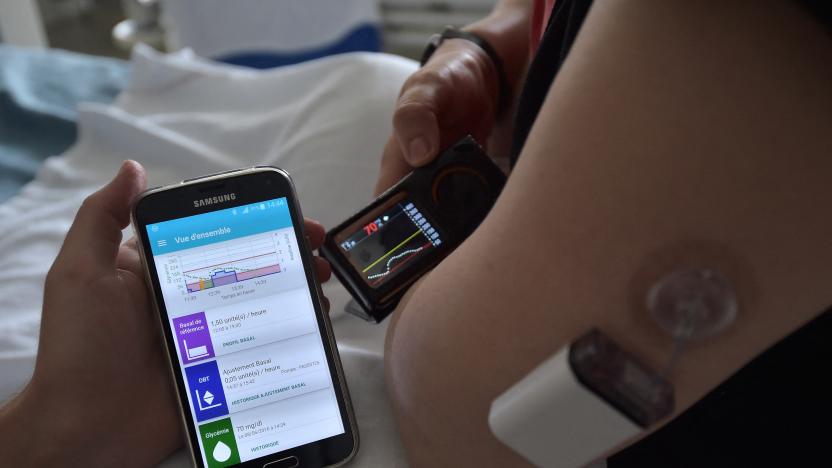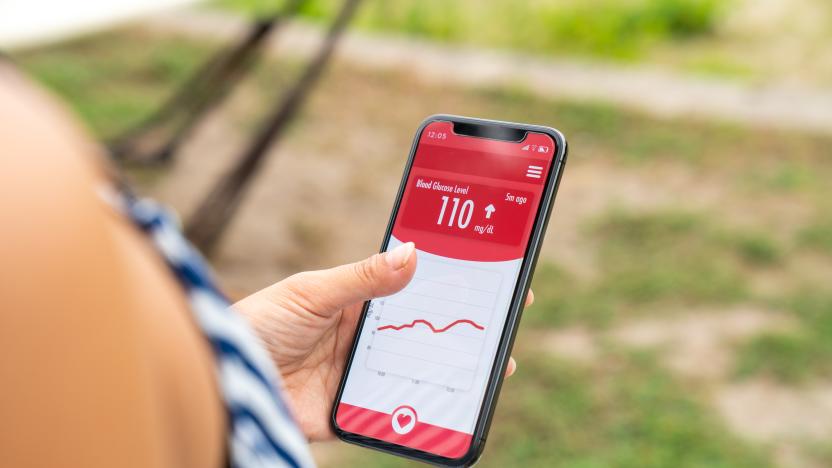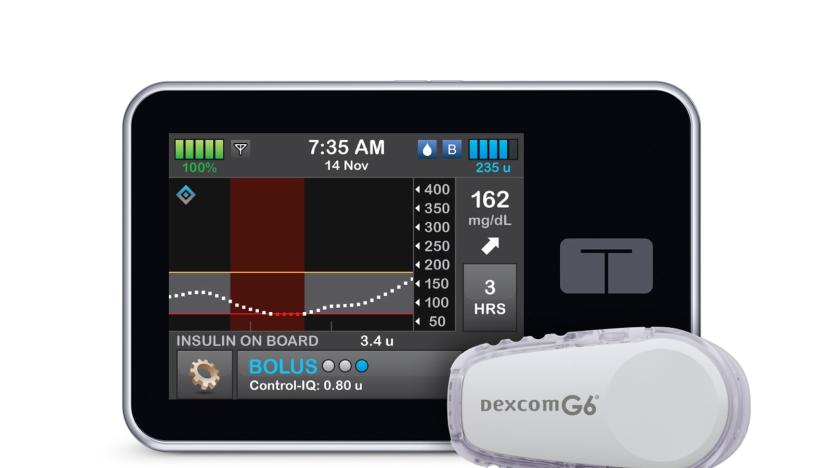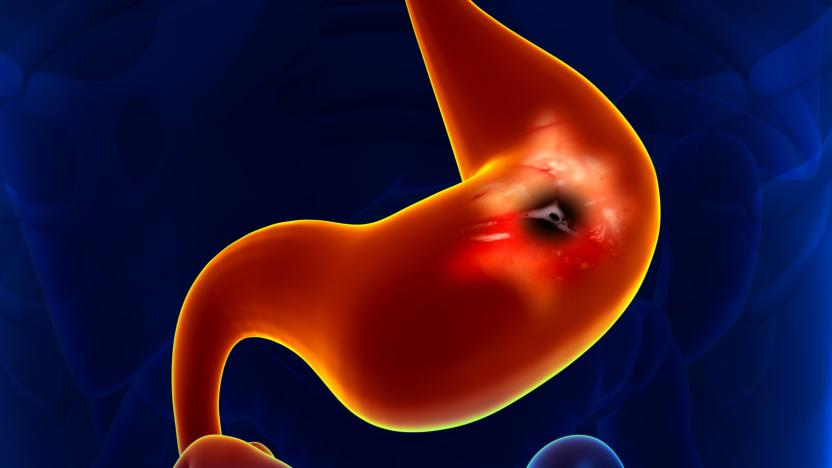insulin
Latest

England’s NHS will provide artificial pancreas to thousands of diabetes patients
England’s National Health Service (NHS) said on Tuesday that “tens of thousands of children and adults” with type 1 diabetes will receive an “artificial pancreas” to help manage their insulin levels.

Amazon-owned PillPack will pay nearly $6 million over DOJ's insulin suit
PillPack, an online pharmacy owned by Amazon, will pay $5.79 million to the U.S. government and states to settle a fraud suit related to its insulin distribution practices.

All-in-one diabetes devices could take the hassle out of insulin injections
MIT is developing all-in-one diabetes devices that could track blood glucose levels, inject insulin and otherwise reduce daily hassles.

FDA approves first automated insulin system for kids
Testing blood sugar frequently and administering insulin as needed throughout the day isn’t easy, especially if the individual with diabetes is a young child who can’t do it on their own yet. Now, there’s an FDA-sanctioned device that could make things easier for parents and caregivers: The agency has approved Medtronic’s MiniMed 770G System for use in children aged 2 to 6 with type 1 diabetes. It can be used for individuals 2 years old and above, but it’s the first of its kind that can be legally marketed towards kids in that age range.

Lasers and smart pills could eventually replace injections
While getting shots or blood work isn't anyone's idea of fun, roughly 10 to 20 percent of American adults suffer from trypanophobia, the extreme fear of hypodermic needles and injections. This phobia can prevent people from partaking in routine medical exams, receiving life-saving vaccines or even properly managing their blood-glucose levels (should they suffer from diabetes). However, a pair of novel injection systems offers the promise of putting those critical medicines into our bodies without ever breaking the skin.

FDA clears an interoperable, automated insulin pump
It might soon be decidedly easier for Americans to manage diabetes -- the FDA has approved the sale of an interoperable, automated insulin pump for the first time. Tandem Diabetes Care's updated t:slim X2 can pair with a Dexcom G6 glucose monitor to dynamically adjust your insulin levels and keep you in a safe glucose range for longer. It can accommodate exercise and sleep, and the Dexcom tie-in spares you from having to stick your finger when you're either dosing yourself at meal time or calibrating.

Stem cell breakthrough could help cure type 1 diabetes
Scientists have edged one step closer to a major treatment for (and possibly cure for) type 1 diabetes. A UCSF team has claimed it's the first to turn human stem cells into the mature, insulin-producing cells that type 1 patients don't have. The key was to acknowledge a reality in the development of islets, or clusters of healthy beta cells (which generate insulin) in the pancreas. They separated partly differentiated pancreatic stem cells into islets, jumpstarting their development and leading to responses to blood sugar that more closely represented mature cells. Even alpha and delta cells grew more effectively, UCSF said.

'Micromotors' alter your gut's chemistry to safely deliver medicine
There's a reason diabetics can't take their insulin orally (for the time being): stomach acid is super effective at dissolving it and similar large proteins, like antibiotics. But rather than force patients to pound pints of Maalox or chew a tub of Tums before taking their medicine, a team of researchers at UC San Diego have developed a novel method of getting your medication past the acid by using nearly microscopic drug delivery vehicles which increase the pH as they swim through your stomach.

Implanting pancreatic cells in your gut could cure diabetes
About 30,000 adults and children are diagnosed with Type 1 Diabetes (T1D) each year. As many as 1.25 million Americans have the disease, according to the Juvenile Diabetes Research Foundation, with up to 5 million expected to have the disease by 2050. T1D is an autoimmune disease where your body stops producing insulin, which can lead to a lifetime of dependence on injected or pumped insulin as well as a host of health complications. New clinical trials, however, show some promising results in "curing" the disease by implanting pancreatic islet cells to the omentum, the tissue that covers abdominal organs.

FDA approves first automated insulin system for type 1 diabetes
For diabetes patients, managing blood sugar levels through insulin pens, needles or pumps is a necessary hassle -- but it might be far easier to handle going forward. The US Food and Drug Administration has approved the first automated insulated delivery device for type 1 diabetes, Medtronic's MiniMed 670G. The gadget uses a sensor to detect glucose levels under your skin every 5 minutes, and supplies just enough insulin to keep your blood sugar stable. While you do have to trigger a manual insulin dose after meals, you generally won't have to be as involved in the process as before.

New stem cell treatment could 'cure' type 1 diabetes
Researchers at MIT and Harvard figured out how to produce pancreatic beta cells -- the ones that produce insulin -- in large quantities back in 2014. The same intercollegiate team announced in the journal Nature on Monday that they've now managed to implant those cells into mice that have been genetically designed to suffer from Type 1 diabetes -- without the cells being rejected. Even more impressive, the diabetic mice produced their own insulin during the 174-day study period, eliminating the need for daily injections. Instead, patients would simply need "booster" injections of beta cells once every few years.

JHU research leads to diabetes treating implant
Although a number of unique diabetes treatments are already in the works, researchers at Johns Hopkins University are giving it a shot of their own with a newfangled intravascular implant. A team of undergrads have collaborated with doctors and biomedical engineers to develop a "specialized implant for a potential treatment of type I diabetes," which has been created for implantation inside the portal vein in order to dole out insulin when needed. The pouch would ideally be "impregnated with insulin-producing pancreatic beta cells," but researchers have insinuated that this same system could possibly be used to treat other ailments such as liver disease. Notably, users could actually have the pouch removed, refilled, and reinserted if additional treatment is needed, and while no firm timeframe has been settled on for release, a provisional patent has already been applied for and "animal testing" is set to start this summer.[Via MedGadget]

Eli Lilly offering up undercover insulin pen to US
There's already a bevy of devices out there designed to keep track and manage one's diabetes and glucose levels, but Eli Lilly's innocuous pen-like injector looks to make the process of taking insulin a bit less invasive. The Huma-Pen Memoir resembles your average ink pen and shouldn't look too out of place holding it down in your tee's front pocket, but whenever you need a shot of insulin, it conveniently turns into an injector thanks to the hidden hypodermic needle encased within. The device also "allows the user to dial the amount of insulin they need to take," and keeps the dosage, date, and time of the previous 16 shots in order to keep diabetics from overdosing. Users should be able to utilize the same pen for "around three years," and after a needle is used, another is inserted and ready to go at the owners request. A few lucky participants have already received their pen here in the US, and while this nifty invention has been available across Europe for some time now, it will officially hit American retail shelves next week for around $45.[Via MedGadget]






